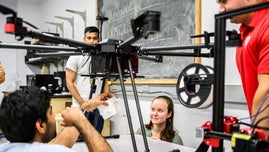Two WPI projects receive $1.6M combined to improve sanitation, education
 Photo | Timothy Doyle
WPI campus in Worcester
Photo | Timothy Doyle
WPI campus in Worcester
This week, Worcester Polytechnic Institute announced two innovative projects addressing different, but wide-reaching, problems will receive grants of $900,000 and $700,000.
One project, the WPI MicroFlush toilet, will receive $900,000 from the Bureau of Humanitarian Assistance at the U.S. Agency for International Development and by Catholic Relief Services of Baltimore over five years, according to a Monday announcement by WPI.
The project, beginning in Ethiopia, seeks to improve sanitation throughout the world by creating a compost toilet which flushes using the same water used for handwashing. The project allows for efficient sanitation while providing fertilizer for agriculture.
The project is part of the Institute for Science and Technology for Development’s new Stephen J. Mecca Lab for Sustainable Development at WPI. Mecca was the inventor of the technology used in the toilets. The Mecca Lab brings together researchers from different disciplines and departments at WPI and other institutions, including the director of the lab, Terrence McGoldrick, a Providence College professor and WPI-affiliated researcher.
“The mission of this project is not only to increase access to sanitation and hygiene services, but also to create new educational and economic opportunities for people in the region, empowering them and increasing the project’s impact,” said McGoldrick in the press release. “If we succeed in moving the needle even a little bit on such a large problem in the world, it’s going to make a big difference in people’s lives.”
The second project aims to develop technology to improve middle-school teachers’ understanding of when and how students are struggling to learn algebra.
Erin Ottmar, WPI researcher and associate professor, was awarded $700,000 by the National Science Foundation to advance artificial intelligence tools for digital mathematics platforms so teachers can better detect, assess, and predict the math strategies and knowledge of their students, according to a Tuesday announcement.
The project uses data gathered from 1,300 students playing a digital math game “From Here to There!” which uses graspable math technology developed by the professor with funding from the U.S. Department of Education.
During the five-year project, Ottmar will collaborate with teachers to design and pilot new tools and ultimately launch a website with free public access to the tools. WPI undergraduate and graduate students, as well as teachers and students from local schools, will participate in the research.
“It’s difficult for busy teachers to quickly and efficiently identify the problem-solving strategies that students are using or failing to use as they learn algebra,” Ottmar said via press release. “It’s a challenge that accelerated during the COVID-19 pandemic as many schools moved to online classes. The goal of this project is to use data mining to develop tools that will provide useful information to teachers in real time to help them better instruct and guide students.”













0 Comments